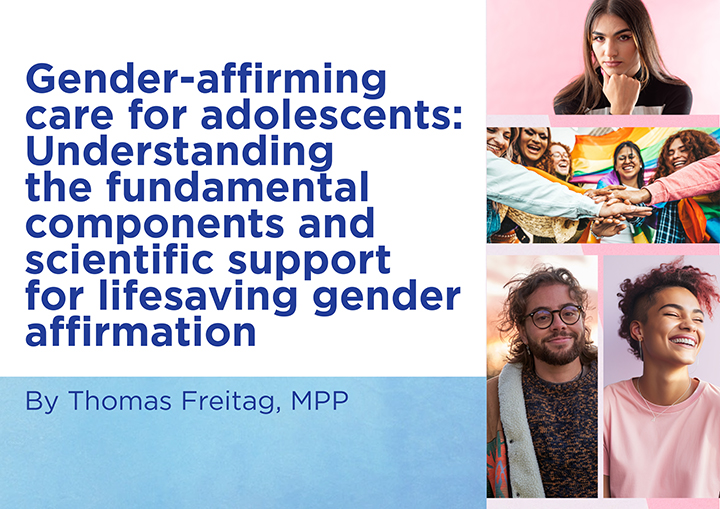BOSTON, APRIL 29, 2024— Twenty-four states have barred access to gender-affirming care (GAC) for transgender and gender diverse (TGD) youth, while countless discriminatory bills targeting TGD communities have been introduced across the country. In the wake of this assault on the rights and safety of TGD youth, The Fenway Institute has released a policy brief titled Gender-affirming care for adolescents: Understanding the fundamental components and scientific support for lifesaving gender affirmation which outlines the importance of gender-affirming care for TGD youth and outlines the medical and scientific evidence that supports it.
This new publication seeks to introduce readers to the basics of GAC for TGD youth. It outlines the changes involved in social affirmation, gender-affirming medical care, and gender-affirming surgical care. In addition, it highlights the scientific research which underlies these practices as well as the positive outcomes associated with GAC for TGD youth.
“Many of the anti-transgender bills introduced in legislatures across the nation have been advanced by reactionary political movements weaponizing misinformation and disinformation. In addition, public discourse surrounding GAC for TGD youth is often distorted by political actors who deliberately misrepresent GAC in an effort to target politically vulnerable communities,” said Thomas Freitag, MPP, a Research Fellow at The Fenway Institute and Harvard Medical School student who authored the brief. “It’s critical that we promote a common understanding for those who might not be familiar with the basics of GAC. Parents and guardians of TGD youth can also face an uphill battle as they work to sort out the science from the speculation. We wanted to create a publication that put accessible data into the hands of those who are being targeted by transphobic misinformation.”
As of April 29, 2024, twenty-four states have laws in place which impede access to gender-affirming medical care for TGD youth. Five make providing such care a felony. Some bills go as far as to mandate that school staff involuntarily disclose TGD children’s gender identity to their parents. Restrictions on GAC have been introduced despite strong opposition from a number of major medical bodies, including the American Medical Association, American Academy of Pediatrics, the American Academy of Child and Adolescent Psychiatry, and the Pediatric Endocrine Society.
Lawmakers have introduced many of these bills under the pretext of GAC for TGD youth being ineffective or “experimental”, despite decades of research which support its efficacy, safety, and importance for the wellbeing of many TGD youth. Reactionary political actors have also targeted medical institutions providing GAC to youth and grossly misrepresented the care they deliver, which has led to harassment of providers and threats of violence.
“Health care practitioners and parents should have the full range of options available to offer the best care possible for young people,” said Dr. Alex Keuroghlian, MD MPH, Director of the National LGBTQIA+ Health Education Center at The Fenway Institute and an Associate Professor at Harvard Medical School who reviewed the issue brief. “The safe and effective use of carefully prescribed, age-appropriate care for transgender and gender diverse youth is supported both by research and by the experience of caring, expert clinicians who want to help their transgender and gender diverse patients thrive. The government should not interfere by restricting and criminalizing health care practitioners and overruling parents when it comes to getting transgender and gender diverse youth the care they need.”
The publication lays out each of the major components of GAC for TGD youth. First, it discusses the practices involved in social affirmation, such as the use of a person’s chosen name, affirming pronouns, and providing a supportive social environment. The brief then highlights much of the research surrounding social affirmation, demonstrating how TGD youth who are socially affirmed experience mental health outcomes comparable to their peers despite the unique social stressors they often face.
Gender-affirming medical care is then explored in detail, with discussions of the goals surrounding pubertal suppression and gender-affirming hormones. The clinical decision-making, physical changes, and management of side effects associated with these medications are described in depth. The scientific research which underlies pubertal suppression and gender-affirming hormone regimens is subsequently highlighted, with the brief outlining the numerous demonstrated benefits of gender-affirming medical care and debunking common myths such as regret rates and the safety of deferring care until adulthood.
Finally, the brief seeks to clarify the role of gender-affirming surgical care in GAC for TGD youth, debunking widespread misrepresentations which have been weaponized by legislators and transphobic political forces. The select circumstances under which some TGD adolescents pursue select surgical procedures are discussed in depth, with a subsequent exploration of the beneficial outcomes experienced by TGD adults who predominantly access gender-affirming surgical care.
The brief represents a critical and comprehensive resource in an era of widespread misinformation. As political forces across the globe target access to GAC, this Fenway Institute publication seeks to provide a detailed, accessible, and scientifically-informed common language that policymakers, parents/guardians, and the public can use to better understand the needs of TGD youth everywhere. You can read it online here.
About Fenway Health & The Fenway Institute
Founded in 1971, Fenway Health advocates for and delivers innovative, equitable, accessible health care, supportive services, and transformative research and education. We center LGBTQIA+ people, BIPOC individuals, and other underserved communities to enable our local, national, and global neighbors to flourish. The Fenway Institute at Fenway Health is an interdisciplinary center for research, training, education and policy development focusing on national and international health issues.


